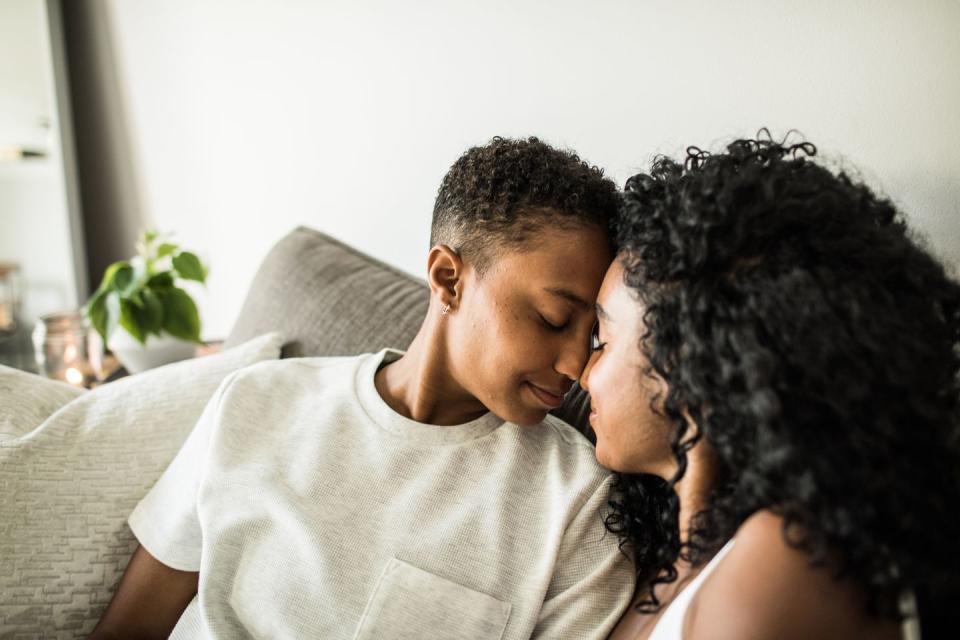The most common relationship issues for cohabiting couples right now
Healthy relationships take work and negotiation at the best of times, let alone during one of the most anxiety-inducing, stressful, grief-filled, scary and simultaneously boring times of our lives. No wonder so many couples have broken up during the pandemic. But for those living with their partners, and who want to continue living with them, some new relationship issues are likely to have arisen thanks to these rather trying circumstances.
"After we entered another lockdown in January, relationships were once again put under strain," explains Marianne Oakes, a counsellor and head of psychological therapies at GenderGP. "We find our dynamics shifting as we not only come to terms with how we are going to navigate the next few months ourselves, but also how we will manage another unknown period of time at home with our partner."
And this in turn, may lead to arguments or at least a change in your relationship dynamic. "Our work dictates so much about who we are, from the routine it instils in us to the conversations it leads to when we kick off our shoes and settle down for the evening. Without it, the toxic combination of ego and pride, mixed with boredom and frustration can lead to an explosive situation," she says.

What's known as the pinch/crunch model dictates that all the small things, (aka the pinches) which usually annoy us but which we are able to forget about as we go about our days, build to become big things (aka crunch points). And Marianne says these things can "destabilise a previously strong relationship".
I spoke to a number of sex and relationships therapists and experts to find out what the most common pandemic and lockdown-related relationship problems couples living together are experiencing. And how to work on them. But, as Marianne says, if in doubt: "Ultimately, be kind to both yourself and your partner, whether we like it or not, this is a marathon, not a sprint."
The problem: Your partner is doing your head in
Most people's partners do their heads in from time to time, and that doesn't necessarily mean there's anything fundamentally wrong with the relationship. But since being in lockdown together, it's likely you've noticed this happening a bit more often.

"Getting no space from each other can make you feel a little claustrophobic and in need of some me-time. When we start a relationship with someone we don’t often think that our main relationship goal is to spend every waking moment with that other person for months and months on end. The outside influences that help keep us nourished and balanced, like seeing friends and family, going to gigs, park runs or whatever you enjoy have been completely removed from our lives," explains Relate counsellor, Holly Roberts.
Because of this, we come to rely on our partners for everything. Holly says this can become too much to manage. "This can put a strain on any healthy relationship, but if cracks were there to start with it may leave couples wondering whether they would be getting so cross with each other if they were able to engage in their normal social activities or is the relationship actually in trouble."
The solution: Be honest
Bottling everything up and pretending everything is OK might sound much easier, but sharing your frustrations with each other can really help. "Letting your partner know you are struggling is positive," she says. "It’s OK to not be OK during these strange times. Getting some space and me-time will help you both recharge emotionally and feel more resilient to what COVID-19 is throwing at us. It will also help give you more perspective to view the relationship in an objective way, rather than responding to issues from a position of being frazzled and burnt out."

The problem: Feeling alone in the relationship
Just because you're spending all your time with someone, that doesn't mean you can't feel lonely. And this realisation can be "profoundly sad" according to Holly. "This highlights the difficult communication patterns some couples have. It shines a spotlight on a lack of communication because neither of you have the normal distractions to hide away from this," she continues.
"Lots of couples are realising that they feel uncomfortable in each other’s company when they aren’t busy doing things. Some couples thrive on being sociable and living hectic lives, but what lockdown starts to show us is that we used these things as a way of distancing ourselves from connecting with our partner on a simple yet intimate level."
The solution: Stop avoiding your partner
Again, it all comes down to being honest and communicating how you're feeling. This will "help you understand whether you are purposefully creating barriers to communication between you and your partner" Holly explains.
"It’s very common to feel uncomfortable in a one-to-one setting, perhaps you dislike these interactions no matter who the person is. But if you realise you are deliberately avoiding your partner then it might be time to address the issue of why you do this. Relationship issues that cause these barriers are most likely to have been there long before lockdown, but COVID-19 has brought them to the fore. Talking to a counsellor to help you work through these issues will help give you both clarity and feel more confident in finding a positive way to move forward."
The problem: Lack of sexual desire
With so much going on, and anxiety and stress at an all time high for many of us, it's no wonder lots of us don't feel like having sex. So if this is how you're feeling, know you're not alone. "Lack of desire, or wanting sexual experiences is something that many couples have reported, and with what we know about desire this isn't really a surprise. We have a blurring of our work/home lives and no shift or difference between the two and this can hinder us in getting in the right headspace for sex," says Kate Moyle, psychosexual therapist and sex and relationship expert for LELO.

"The context change that we normally have helps us to think about a certain space ( usually the bedroom ) as a sexual place, whereas now for many it has also become their office, living room and space for them to have some alone time. Distraction is also a real passion killer, and it's quite hard not to be distracted if we can't physically escape all of the things on our to-do-list because they are in our bedroom too."
The solution: Make space for sex
Desire needs to be triggered or cued in some way, as contrary to what many of us think - that we should it spontaneously and out of the blue - it is actually responsive. "As a couple, make space for it, organise a space in your home for the evening. You could move the bedding to the floor, change the feel of the room with lighting, and turn off your tech," Kate suggests.
"Focusing on each other, with touch, kissing, eye-contact and connecting will help you to shift into that more sensual and sexual space, and separating that from everything else you have going on will really help you to relax into it."
The problem: Feeling bored of sex
We've been told that during these "trying times", a routine when working from home can make all the difference. But at the same time, routine can lead to feeling bored and unfulfilled.
"While routine is good for many of us in the rest of our lives (and can be really helpful for us for managing our time during lockdown), in our sex lives it's not that helpful," Kate says. "Our sexual and intimate lives being predictable doesn't boost desire; and so try and make a conscious effort to break away from doing things the same way constantly."
The solution: Change just one thing
It really can be as simple as changing one thing when you have sex. Kate explains, "Lights on/off, starting with clothes on/off, lube/no lube, a new position, introducing a sex toy, not having to end with intercourse - the list is never-ending. If you know how it's going to go every time then it will create less positive anticipation; so a bit of creativity can do wonders for your sex life, but it doesn't have to be intimidating."

The problem: You're arguing over housework
Lohani Noor, psychotherapist and couples and relational therapist for BBC’s Sex On The Couch says conflict over the division of labour is featuring high on the conflict radar at the moment. "As couples find themselves working from home, the diversifying use of the home increases, so does the need for shopping, cooking, cleaning and generally organising and sorting the home/now work space. Historically this might have been less of a problem as less time was spent at home.
"Some couples find that one of them naturally takes the lead in managing the household. The person who takes the lead isn’t always happy to do so and may spend many frustrating hours trying to explain the knackering impact of carrying the mental load for the home. Hearing their partner simply say, ‘Just tell me what to do’ isn’t good enough, in fact some household managers claim that having to think about the dissemination of domestic labour is exhausting and time consuming and so they end up just doing it themselves, while their partner happily enjoys the benefits of their planning and labour."
The solution: Work together
"The answer of course is to collaborate," Lohani says. She suggests getting together to write a list of all the household duties, from taking the rubbish out to replacing the hand towels in the bathroom. "Then simply divide it up between you. Importantly each partner is to take complete responsibility for the jobs they choose. So if you are responsible for cleaning the bathroom, you need to make sure you alert the person responsible for shopping when you are running low on bathroom cleaning materials… that information doesn’t communicate itself by magic."
SUBSCRIBE HERE to have Cosmopolitan delivered to your door.
Like this article? Sign up to our newsletter to get more articles like this delivered straight to your inbox.
LOOKING FOR YOUR NEXT FAVOURITE PODCAST? LISTEN TO COSMOPOLITAN'S ALL THE WAY WITH... ON APPLE PODCASTS, SPOTIFY, ACAST AND ALL THE USUAL PODCAST APPS.
You Might Also Like


